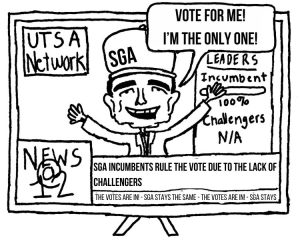
Fabian De Soto, The Paisano
With enrollment continuously on the rise, the mental health of college students is a major concern. The rise of social media and increased job competition intensifies pressure felt by incoming students to live up to societal standards and compete in a global economy, which often leads to depression.
In 2014, The Cooperative Institutional Research Program at the University of California conducted a survey of more than 150,000 students nationwide about campus depression, and the results were not inspiring. The study stated that “9.5 percent of respondents had frequently ‘felt depressed’ during the past year, a significant rise over the 6.1 percent reported just five years prior. Those who felt ‘overwhelmed’ by work, school and other commitments rose from 27.1 to 34.6 percent.”
In an effort to gain insight into how UTSA compared to national statistics, The Paisano interviewed Melissa Hernandez – Assistant Director of Counseling Services of twelve years – about common trends of depression and anxiety amongst students.
“Anxiety and depression are two of our top related concerns,” Hernandez states, “but over the last three years, the number of students seeking assistance for those issues in particular has held pretty steady based on student enrollment and percentages. What I have seen over the past few years is an increasing number of students coming in for more severe issues. College counseling used to be about adjusting to college life, yet over the past fifteen years it has become more and more a situation of students coming in with diagnosable mental health conditions.”
According to Hernandez’s record for the 2014-2015 academic year at UTSA, students counseled with general anxiety disorder totaled 496, and students with general mood disorders, including depression, 619. Counseling Services provided help to 1,399 students last year, averaging 1,200 to 1,500 students per year.
The focus of Counseling Services is to provide short-term care to currently enrolled students. For students in need of long-term therapy, Counseling Services provides referrals to the UT Health Science Center, University Hospital or Methodist Specialty and Transplant Hospital.
Hernandez also explained the move from the UC to the RWC building had less to do with visibility and more with providing the best care they can for UTSA students. “The idea was to create a center for wellness that was designed and created for the specific needs of recreation, health, and counseling,” explained Hernandez. “Although moving from the center of campus detracts from visibility and awareness, it can also be attractive to students for the purpose of privacy and confidentiality.”
Counseling Services also provides a variety of one on one sessions and group therapy to students. “Managing Your Mood” with Adam Lofti and “Guided Meditation” with Cristina Hernandez help those with depression and anxiety every Wednesday from 1-5 p.m. Both sessions take place in the group room located at the RWC 1.810.
The Counseling Services office is open until 7 p.m. on Tuesdays and Wednesdays for walk-ins, along with an after-hours crisis help line through UT-Austin.
Hernandez knows the best way to get a student help is to walk them into the counseling office. “Actively engage in discussion about it amongst friends to decrease stigma about mental health. Talk about it openly without judgment. Be an active bystander. Find someone that can help.”










